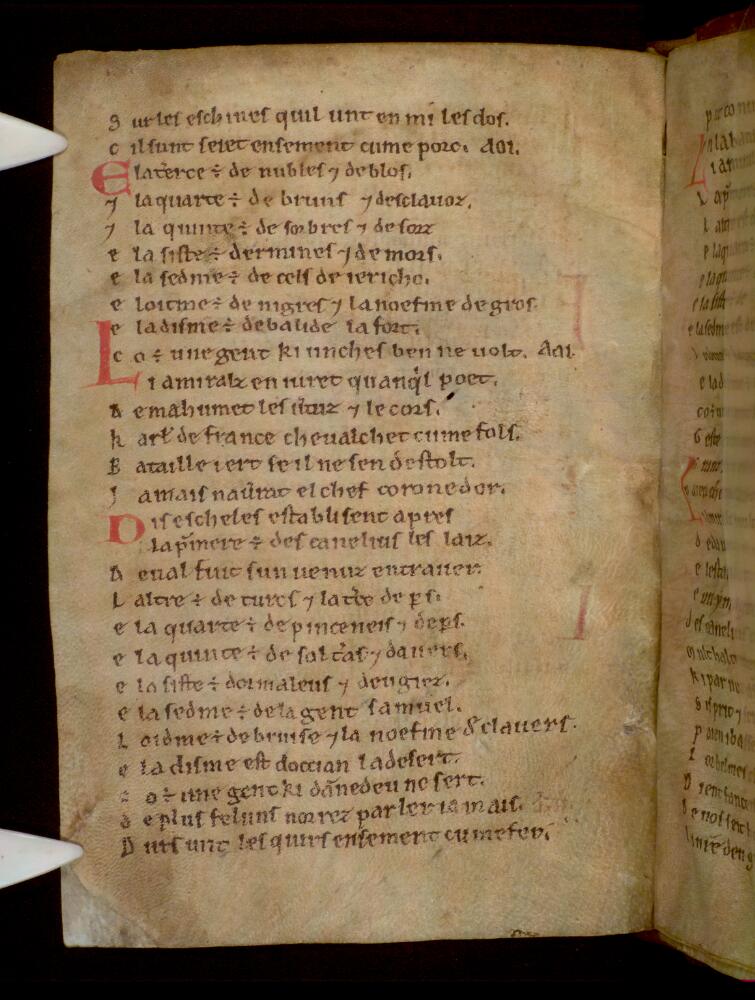|
Richeut
Richeut is the earliest known fabliau, dating from 1159. Although ''Richeut'' shares many of the same characteristics as other fabliaux, it has several unique features: 1. It mentions the outcome of a sexual encounter. 2. It breaks the taboo of incest. 3. It is unusually long, containing 1019 lines. 4. It does not use octosyllables, but a tailrhyme strophe. 5. It has character development. 6. The characters of Richeut and Herselot, the maid, exist outside of this text. Summary This tale recounts the life of a prostitute who uses men to her advantage. She does not discriminate between classes, for she dupes a nobleman, a bourgeois and a clergyman into believing that they are the father of her son, whom she conceived on purpose because she felt that they were no longer paying her enough attention. All three men lavish her and her son with gifts to the point of ruining themselves. Her son, Samson, grows up with all of the privileges that money can buy. Bored by his surr ... [...More Info...] [...Related Items...] OR: [Wikipedia] [Google] [Baidu] |
Fabliau
A ''fabliau'' (; plural ''fabliaux'') is a comic, often anonymous tale written by jongleurs in northeast France between c. 1150 and 1400. They are generally characterized by sexual and scatological obscenity, and by a set of contrary attitudes—contrary to the church and to the nobility. Several of them were reworked by Giovanni Boccaccio for the ''Decameron'' and by Geoffrey Chaucer for his ''Canterbury Tales''. Some 150 French ''fabliaux'' are extant, the number depending on how narrowly ''fabliau'' is defined. According to R. Howard Bloch, ''fabliaux'' are the first expression of literary realism in Europe. Some nineteenth-century scholars, most notably Gaston Paris, argue that ''fabliaux'' originally came from the Orient and were brought to the West by returning crusaders. History and definition of the genre The ''fabliau'' is defined as a short narrative in (usually octosyllabic) verse, between 300 and 400 lines long,Cuddon 301. its content often comic or satiric.Abram ... [...More Info...] [...Related Items...] OR: [Wikipedia] [Google] [Baidu] |
Clairvaux Abbey
Clairvaux Abbey (, ; la, Clara Vallis) was a Cistercian monastery in Ville-sous-la-Ferté, from Bar-sur-Aube. The original building, founded in 1115 by St. Bernard, is now in ruins; the present structure dates from 1708. Clairvaux Abbey was a good example of the general layout of a Cistercian monastery. The abbey has been listed since 1926 as a historical monument by the French Ministry of Culture. The grounds are now occupied and used by Clairvaux Prison, a high-security prison. History In 1115 Bernard, a Benedictine monk of the Abbaye de Saint-Nicolas-lès-Cîteaux, was sent with a group of twelve other monks to found a new house at Vallée d'Absinthe. Hughes I, Count of Troyes, donated this valley to the colony of Cistercians.Gildas, Marie. "Abbey of Clairvaux." The Catholic Encyclopedia [...More Info...] [...Related Items...] OR: [Wikipedia] [Google] [Baidu] |
Medieval French Literature
Medieval French literature is, for the purpose of this article, Medieval literature written in Oïl languages (particularly Old French and early Middle French) during the period from the eleventh century to the end of the fifteenth century. The material and cultural conditions in France and associated territories around the year 1100 unleashed what the scholar Charles Homer Haskins termed the " Renaissance of the 12th century" and, for over the next hundred years, writers, " jongleurs", "clercs" and poets produced a profusion of remarkable creative works in all genres. Although the dynastic struggles of the Hundred Years' War and the Black Death pandemic of the fourteenth century in many ways curtailed this creative production, the fifteenth century laid the groundwork for the French Renaissance. Language Up to roughly 1340, the Romance languages spoken in the Middle Ages in the northern half of what is today France are collectively known as "ancien français" ("Old French") ... [...More Info...] [...Related Items...] OR: [Wikipedia] [Google] [Baidu] |

